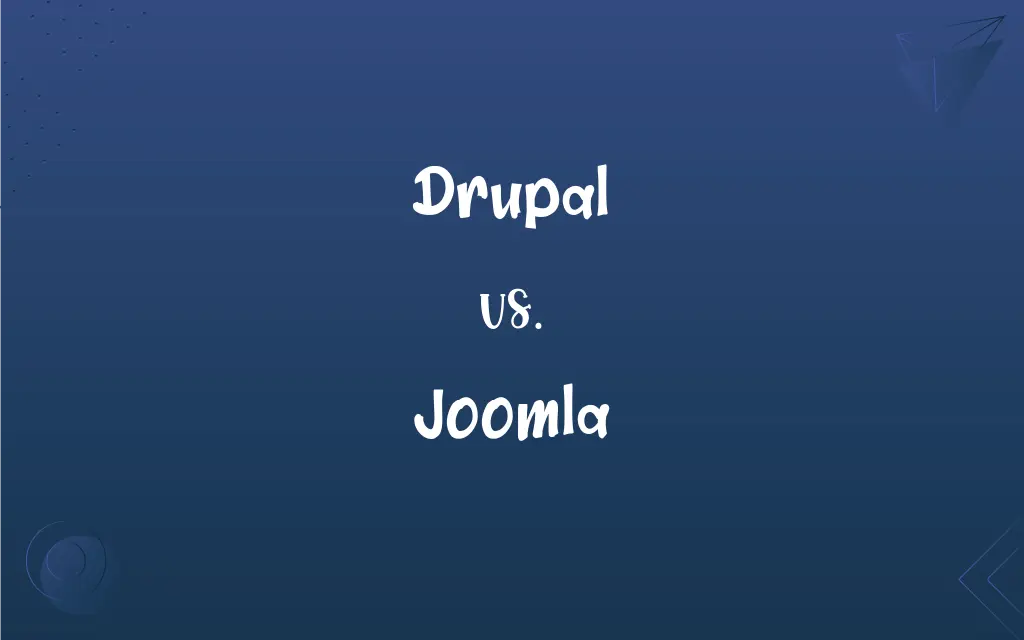Drupal vs. Joomla: What's the Difference?
Edited by Aimie Carlson || By Harlon Moss || Updated on October 26, 2023
Drupal and Joomla are both open-source content management systems (CMS), but Drupal offers more customization and scalability while Joomla is user-friendly and offers pre-built extensions.

Key Differences
Drupal is a popular content management system known for its flexibility and scalability. It's often chosen by large enterprises and those who need a robust, customizable platform. Joomla, on the other hand, is another well-known CMS that is typically seen as more user-friendly and ideal for those who want a quicker setup with pre-made extensions.
In terms of development, Drupal demands a steeper learning curve and is often preferred by developers who are looking to build complex, tailored solutions. Joomla is simpler to grasp and can be a better fit for those without deep coding knowledge, wanting a website up and running in a shorter span of time.
When it comes to theming and design, Drupal offers a more granular control, allowing developers to create a unique user experience. Joomla provides many ready-to-use templates and themes, making it easier for users to quickly design an attractive site.
Drupal has a strong emphasis on user roles and permissions, providing a fine-tuned control over who can see and do what on the website. Joomla, while also offering user role capabilities, tends to be more straightforward in this aspect.
Community and support are vital for open-source platforms. Drupal has a large, active community that regularly contributes to its modules and themes. Joomla also boasts a strong community, with numerous extensions available, reflecting its user-centric approach
ADVERTISEMENT
Comparison Chart
Nature
A flexible and scalable CMS.
A user-friendly CMS with pre-made extensions.
Learning Curve
Steeper, more suitable for experienced developers.
Simpler, ideal for beginners or those without deep coding knowledge.
Design Control
Granular, with more customization options.
Offers numerous ready-to-use templates.
User Roles
Highly detailed user roles and permissions.
Straightforward user role capabilities.
Community
Large community, regularly contributing to modules and themes.
Strong community with many available extensions.
ADVERTISEMENT
Drupal and Joomla Definitions
Drupal
An open-source CMS known for scalability.
Many large corporations use Drupal to manage their websites due to its robustness.
Joomla
Offers numerous pre-built extensions and templates.
With Joomla, you can have a site up quickly using its pre-made themes.
Drupal
A platform often chosen for custom website solutions.
If you need a tailored website, Drupal might be your best bet.
Joomla
Features a more straightforward user role system.
Managing users on Joomla is easy and intuitive.
Drupal
Recognized for its detailed user roles and permissions.
For detailed user management, Drupal is a top choice.
Joomla
Suited for those who want a less complex setup process.
I recommend Joomla for clients who want simplicity in their website setup.
Drupal
Supported by a large, active community.
The Drupal community constantly updates modules, making the platform even better.
Joomla
An open-source CMS known for its user-friendliness.
If you're new to website building, Joomla is a great place to start.
Drupal
Demands a deeper understanding of coding for development.
As a developer, I prefer Drupal for its coding flexibility.
Joomla
Boasts a strong community with many extensions available.
The Joomla community is always releasing new tools and extensions for the platform.
Drupal
(botany) drupaceous
Drupal
Drupaceous.
FAQs
What is Joomla?
Joomla is an open-source content management system renowned for its user-friendliness and pre-made extensions.
Is Drupal beginner-friendly?
Drupal has a steeper learning curve and is more suitable for those with some web development experience.
What is Drupal?
Drupal is an open-source content management system known for its flexibility and scalability.
How user-friendly is Joomla for beginners?
Joomla is seen as more beginner-friendly with many pre-built extensions and templates.
Can I create an online store with Joomla?
Yes, Joomla offers extensions that allow for e-commerce capabilities.
How often are Drupal and Joomla updated?
Both platforms receive regular updates from their respective communities to enhance functionality and security.
Which is more cost-effective: Drupal or Joomla?
Both are open-source and free to use, but the total cost depends on hosting, themes, extensions, and potential development costs.
How do extensions in Joomla compare to modules in Drupal?
Joomla extensions add functionality to a site, similar to Drupal's modules. However, Drupal's modules can offer more in-depth customization.
Which has a stronger community: Drupal or Joomla?
Both have strong communities, but Drupal is noted for its active contributions to modules and themes, while Joomla's community often releases new extensions.
Which CMS is more secure: Drupal or Joomla?
Both CMSs prioritize security, but the security of a site also depends on how it's set up and maintained.
Is Drupal suitable for e-commerce?
With the right modules, Drupal can be used to set up a robust e-commerce platform.
How does Joomla handle user management?
Joomla provides a straightforward system for user roles and permissions.
Is Drupal faster than Joomla?
Website speed depends on many factors, including hosting, configuration, and optimization practices. Both platforms can be optimized for speed.
How does Drupal handle content?
Drupal offers a highly flexible content architecture, allowing for complex content types and views.
Is Joomla mobile-responsive?
Many Joomla templates are mobile-responsive, ensuring a good user experience on all devices.
Which is better for SEO: Drupal or Joomla?
Both platforms can be optimized for SEO, but the results depend on the site's setup and ongoing SEO practices.
Which has more themes: Drupal or Joomla?
While both offer numerous themes, Joomla is known for its plethora of ready-to-use templates.
Do both Drupal and Joomla support multilingual sites?
Yes, both platforms have robust capabilities for creating multilingual websites.
Is Drupal more customizable than Joomla?
Yes, Drupal offers a higher degree of customization compared to Joomla.
Can I migrate my website from Drupal to Joomla or vice versa?
Yes, but migration requires careful planning and possibly the assistance of experts to ensure data integrity.
About Author
Written by
Harlon MossHarlon is a seasoned quality moderator and accomplished content writer for Difference Wiki. An alumnus of the prestigious University of California, he earned his degree in Computer Science. Leveraging his academic background, Harlon brings a meticulous and informed perspective to his work, ensuring content accuracy and excellence.
Edited by
Aimie CarlsonAimie Carlson, holding a master's degree in English literature, is a fervent English language enthusiast. She lends her writing talents to Difference Wiki, a prominent website that specializes in comparisons, offering readers insightful analyses that both captivate and inform.
































































